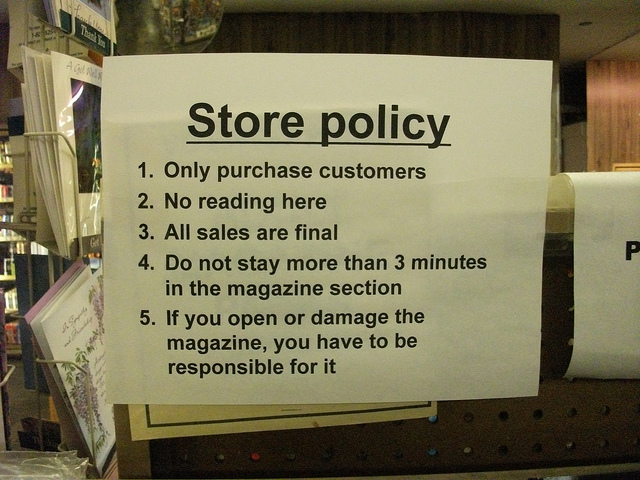What’s Your Policy?
As a lawyer who makes a living reading, writing and revising contracts it’s in my best interest to tell you that contracts are incredibly important and if you don’t have a contract your clients will get away with murder.
And that’s true.
But also not.
Contracts are important tools for managing difficult clients and getting paid on time. But they aren’t the only tools you have at your disposal.
In fact, if you’re putting all your freelance eggs in the “I have a contract!” basket, you’re likely missing out on some easy and effective ways to get your clients to do what you want them to do.
One of the easiest ways to get your way with clients is by having policies.
Policies are the rules your business follows to get work done.
A good policy is one that makes it easy for you to do your work. It allows you to focus more of your time on doing the thing you’re good at and less of your time on administrative tasks. It tells your clients exactly what they need to do to get your attention (the good kind) and what they can expect from working with you.
In order to be effective though, your polices need to be easy to find and follow.
I’m a big advocate of having your policies either as an FAQ page on your website or as a separate “I’m looking forward to working with you!” packet when you take on a new client.
If you speak in “thou shalts” and “thou shalt nots” feel free to write your policies that way, but don’t feel compelled to. Remember: these are tools that you have to use, so having them feel natural to how you think and speak is important. We’re all more inclined to use tools we feel comfortable with and avoid those that are complicated or foreign feeling.
So what should your policies be?
Pens & paper, freelancers! (Opening a new document on your computer machine is perfectly fine, too.)
Think about your work with clients and answer the following questions. Don’t feel like there is a “right” answer to any of these; just write down what comes to mind. You’ll likely have more than a few answers to each question.
- Are there questions most or all of your clients ask you?
- Are there issues or concerns that come up more often than you’d like?
- Are there problems that you’d like to make sure never happen with another client again?
Look over what you’ve written down. What are the themes you see in the concerns you’ve identified? Money? Communication? Timeline expectations? Identify three to six themes and chuck up your answers accordingly.
The themes are your areas of concern, while the answers you’ve developed are specific issues within those areas.
What rules or boundaries will allow you to address all of these issues? Those are your policies.
Looking over your list you might find that a handful of broad policies will address all of your issues. Or you might need separate policies for each issue. Whatever you do: use an approach you are most likely to use. If you know you hate following a dozen different rules, don’t create a dozen different policies.
Now that you know what your policies are you have to decide how you’ll present them. Think about your clients and what they tend to pay attention to. How do they like to consume information? What types of documents are they used to reading? Pick a format that fits your clients.
You could build an “FAQ for Clients” that is easily found on your website. Or a Welcome Letter you send clients before a job begins that tells them what to expect when working with you and what to do if they have questions. It could also be just a document titled “Working Policies” that you provide clients and prospective clients.
Don’t feel you have to stick with one approach either; it’s OK to have your policies listed in a couple different areas. Just make sure that no matter where your policies are written, you’re consistent in what you’re telling clients.
Do you use policies in your business? What works well for you?
Have feedback or questions about the exercise in today’s post? Please let me know in the comments!
Curious about other tools you can use in your freelance business to get paid? Sign up here to be the first to hear about my new online class.
Categories: The Rest







[…] 23/06/2014 What’s Your Policy? by Katie Lane (Work made for Hire) […]